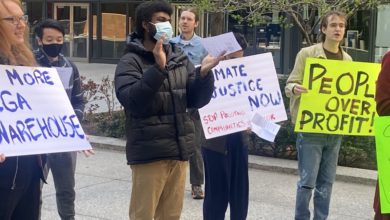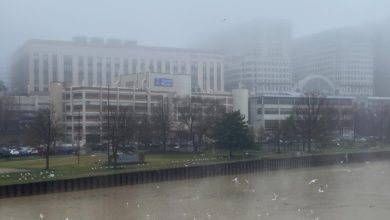This article is
based on a speech given April 23 at the 2011 Earth Day Festival in
San Francisco.
The
recent events in northern Japan, the Gulf Coast, Appalachia and the
rising seas highlight the critical moment we are in 41 years after
the first Earth Day.
According
to their annual report, 2010 was the “best year in safety
performance” for TransOcean in their company’s history. And, as a
result, the top managers of TransOcean—the company that drilled
BP’s Deepwater Horizon oil rig that exploded a year and a few days
ago killing 11 workers, injuring many more and dumping 200 million
tons of oil into the Gulf of Mexico—all got big “safety
bonuses.” Really—you can’t make this stuff up.
Much
of the Gulf coast is devastated. A recent survey of 423 fishermen and
women revealed that 2 percent are engaged in sustainable fishing,
while 79 percent are awaiting payment of claims from the fund set up
by BP and administered by Kenneth Feinberg, who the fishers refer to
in their petition as “BP’s henchman.”
Many
of the people who participated in the clean-up effort and many who
just live along the Gulf Coast are sick, some very sick, with high
levels of oil and dispersant-related toxins clearly detectable in
their blood. The long-term effects remain to be known.
But
while Feinberg has been delaying many claims from working people, and
pressuring others to take $25,000 and sign away their rights to
pursue litigation in the future against BP, TransOcean and
Halliburton, impacted corporations have been treated very
differently. Omega Protein, a giant fish meal company, has received
$44 million, the largest settlement so far.
Meanwhile,
no new legislation has been passed to regulate drilling in the Gulf.
The statutory limit of $75 million remains in place. On the contrary,
several bills are making their way through Congress as we speak to
make it easier for the giant oil companies to get around
environmental impact requirements and start drilling—not only in
the Gulf but off the Atlantic coast, in the Arctic and elsewhere.
BP’s
profits are back at record levels, like the other big oil companies,
and will go even higher through the jacked-up price of gas.
If
there is one thing that the BP disaster, like the banking crisis,
makes crystal clear it is this: That while the government rules over
the people, over us, big money, big capital—the interlinked oil,
banking and military-industrial corporations rule over the
government.
For
them, the real law of the land is not just profit, but the
maximization of profit—regardless of the cost to the people and
the planet. It is system that is out of control. As long as
maximizing profit at all costs is the inherent, built-in motive force
of the system we live under—the capitalist system—we are sure
to have more Deepwater Horizons, more Fukushimas, more Massey Energy
disasters.
In
his last address to his organization, the Southern Christian
Leadership Conference’s national board, in 1967, just a few months
before he was shot down, Dr. Martin Luther King, Jr. made a speech
about wealth and poverty in the world. This is a speech that has been
conveniently forgotten for the most part.
“It
means that questions must be raised” he said. “And you see, my
friends, when you deal with this you begin to ask the question, ‘Who
owns the oil?’ You begin to ask the question, ‘Who owns the iron
ore?’ You begin to ask the question
, ‘Why
is it that people have to pay water bills in a world that’s
two-thirds water?’ These are words that
must be said.”
These
are questions and words that must be said even more urgently today.
The vital and diminishing resources of the world are more and more
concentrated in fewer and fewer hands, in the hands of those for whom
sustainability is the last thing on their minds. How did a few come
to own what is necessary for the lives of the many? The answer in
most cases is that they appropriated it—or to speak more plainly
– they stole it.
It
can’t go on like this. What is truly unsustainable is the present
system—we and the world we live in can’t take too much more of
climate change, waste of irreplaceable resources, wanton
environmental destruction, massive conversion of food to fuel, the
dispossession of indigenous peoples, wars, occupations and empire.
Real
change, the change we really need, we will not come about by just
electing the right officials, it will come about the way that all
really progressive change has come about in the past—through a
powerful, numerous and determined people’s movement. That is what
the ANSWER Coalition, and I believe many of the other organizations
participating here today are all about. We urge you to get involved,
become an organizer—that is something that everyone can do.






